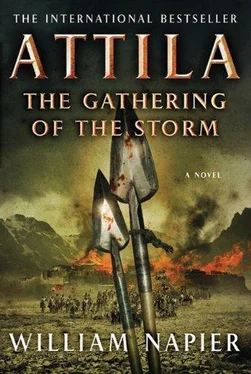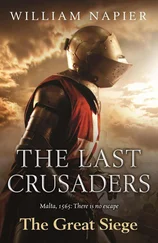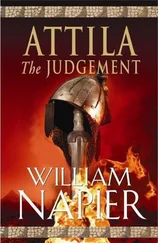William Napier - The Gathering of the Storm
Здесь есть возможность читать онлайн «William Napier - The Gathering of the Storm» весь текст электронной книги совершенно бесплатно (целиком полную версию без сокращений). В некоторых случаях можно слушать аудио, скачать через торрент в формате fb2 и присутствует краткое содержание. Жанр: Исторические приключения, на английском языке. Описание произведения, (предисловие) а так же отзывы посетителей доступны на портале библиотеки ЛибКат.
- Название:The Gathering of the Storm
- Автор:
- Жанр:
- Год:неизвестен
- ISBN:нет данных
- Рейтинг книги:3 / 5. Голосов: 1
-
Избранное:Добавить в избранное
- Отзывы:
-
Ваша оценка:
- 60
- 1
- 2
- 3
- 4
- 5
The Gathering of the Storm: краткое содержание, описание и аннотация
Предлагаем к чтению аннотацию, описание, краткое содержание или предисловие (зависит от того, что написал сам автор книги «The Gathering of the Storm»). Если вы не нашли необходимую информацию о книге — напишите в комментариях, мы постараемся отыскать её.
The Gathering of the Storm — читать онлайн бесплатно полную книгу (весь текст) целиком
Ниже представлен текст книги, разбитый по страницам. Система сохранения места последней прочитанной страницы, позволяет с удобством читать онлайн бесплатно книгу «The Gathering of the Storm», без необходимости каждый раз заново искать на чём Вы остановились. Поставьте закладку, и сможете в любой момент перейти на страницу, на которой закончили чтение.
Интервал:
Закладка:
As they rode west, Aladar came alongside him and said, ‘My lord, the lawyer – he was a shaman? One Who Knows?’
‘No,’ said Attila with a shake of his head. ‘Not a lawgiver, a dispenser of wisdom. A law-maker: a petty haggler in courts full of like hagglers. A man who lays chains on other men’s souls, who harvests souls for gold. In the Empire of Rome such men are highly regarded, and become orators, senators, politicians.’
‘Politicians? Politicians are like kings.’
‘No.’ He grinned sardonically. ‘Politicians are nothing like kings.’
They rode on.
After a while he said, ‘In Rome they have laws that forbid the people to ride in a carriage though the town after dark. Any who do so are punished.’
‘But surely such contemptible laws are ignored?’
‘No, they are obeyed.’
Aladar tried to comprehend this lunacy, then roared with laughter at his failure. ‘Why?’
‘Because,’ said Attila, ‘they believe themselves to be free men under the law.’
‘The lawyer, he bullied the people that way?’
‘No doubt.’
Aladar scowled. ‘I would have cut his throat myself.’
After midnight they slept for four hours, and in the cold before dawn they rode on beside the Maeotic Lake.
The soldiers from the garrison at Tanais came after them as the sun rose behind them over the dark lake and the sky glimmered low and white and silver. Attila halted them and swung them round to face east, a tiny skein of wild geese on the wide sands. They watched silently for a while as the brightly armoured troop of imperial cavalrymen galloped towards them. They would be upon them soon.
They beat the two trussed merchants unconscious and hobbled their horses, then kicked their own horses into a gallop. Csaba and Aladar veered left of the oncoming horsemen, while Attila led Yesukai and Orestes right into the shallows, all four keeping moving as they nocked, aimed and loosed their arrows from a distance already lethal.
Attila roared instructions as they rode: ‘Hit the front horses!’
Arrows hummed in the bright air and two horses stumbled, one going down in an explosion of sand. Over that sprawl of horse and man, another two troopers tripped and fell. The others came on, twenty or more of them. Two troops from a cavalry ala of eighty or so, in light armour, with long, deadly lances held low. The un-armoured and outnumbered Huns eluded engagement, constantly reforming and then melting aside, galloping furiously beyond the Romans’ flanks and firing arrows behind them as they fled, or seemed to flee, then taking the higher ground the troopers had just abandoned. Ceaselessly the thin arrows hissed in the fiery dawnlight and slipped through thin chainmail hauberks and cuirasses and burrowed into chests and stomachs, and burst through again, men toppling ungainly to the ground.
The troopers milled in confusion, most of them stuck with arrows in shoulders or thighs, blood trickling thin and watery over bright steel. Their lieutenant yelled to them to form up and close in with swords drawn, but they had lost all hope of closing with so ghostly a target. Again the barbarian horsemen wheeled down off the ridge into the burning early sun and then back, whooping with joy, turning on the spot almost at full gallop in a slew of sand and stone. Their brute-headed horses were driven back upon their squat, powerful haunches as they turned at a tight gallop, then rose up again and drove forward, straight out of the blinding light from the sun. Everything stinging and hurting and dazzling for the blinded cavalrymen as their assailants came skimming across the lakeshore, flying through the dreamlike shallows, the sluggish waters kicked up into arcs of quicksilver by flashing hooves, spangles of spindrift bright in that luminous morning. The ceaseless swish of arrows curving down through the bright air. The lost soldiers were in disarray, feeling the nooses and nets descending over their heads and shoulders, their horses crippled under them, their forelegs bound by hemp lassoes weighted with leaden hooks cast by these howling invisibles. The air was filled with the flash and dazzle of the mocking sunlight, and whoops of victory and nodding topknots and flying ribbons, wild white-teeth yells and blue tattoos fiercely pulsing. The Roman horses cruelly hobbled and spancelled, kneeling suddenly on the shining mudflats as if in penitence and hopeless supplication, and then the copper-skinned horsemen riding in alongside each baffled cavalryman, knocking aside his sagging lance and despatching him with a single thrust of dagger or spear. Sometimes the wretched cavalryman would raise an arm in a last gesture of defence, at which a Hun sword would slice straight through hardened leather vambrace and forearm both and lop them clean off, then despatch the rider. Men were turning and toppling all around, rolling forward over their horses’ lowered heads and dropping softly into the mud, the silvery water of those shining levels stained red by sun and blood, speared horses sighing and sinking into oblivion. The lieutenant was now just a headless trunk on the sand, gouting blood. The last few cavalrymen now seemed to wait like cattle for slaughter, or like a stricken herd of game surrounded by numberless and nameless predators. While the naked warriors laughed and chattered throughout the killing, as if engaged merely in some joyous ritual celebrating the endless wonder and changefulness of creation.
Csaba and Aladar had dismounted and were tramping happily through the shallows, taking scalps. Plain iron helmets lay half drowned in the clouded water, and men curled up or strangely skewed on the mud with their heads sliced asunder, their foreheads fronded with blood, their faces covered and cauled with scarlet, their opened skulls releasing a pearl-grey curd upon the waters. Csaba sang a song of victory. Aladar threw back his head and laughed and held out his right arm weltered with blood to the shoulder. He shook out his fistful of scalps and drops of blood wheeled and arced in the glistening sunlight like some dark molten mineral spewed from the volcanic earth and then fell and dissolved into the waters below as if they had never been.
They left the slain horses and the bodies and the severed limbs lying in the crimson foam at the water’s edge and rode on, hallooing with wild triumph. The two Byzantine merchants stirred and groaned, still bound and slung like baggage across the saddles of the captured horses. Csaba had a deep cut across his forehead which had nearly sliced into his eye and was bleeding heavily, but he seemed not to notice. Attila had a bad gash across his upper arm, a flap of skin hanging loose and blood flowing out and down over his forearm. The battle done and their wild victory gallop pulled to a halt, he stopped and tied it closed with a strip from one of the merchant’s robes. He ordered Csaba to do the same. Then he looked his men over.
They gazed back at him with something like adoration. Their king. Their undefeated, indefatigable king. Their first blood, first victory. How they longed now for more. For the appetite for victory, as for fame or gold, is inexhaustible. The hunger grows with feeding.
Attila smiled. ‘Homeward,’ he said.
They spoke not another word all that hard day’s riding. But at night, beside the campfire as they ate, he addressed them.
‘Some men worship right and wrong, or make good and evil their gods and their goals,’ he said. ‘I believe in life and death. The question is not “Is it right?” but “Does it make me feel more alive?” This is at the heart of everything! This is the pattern and template by which the gods have made the earth. To be a birthingbed for life, and yet more life! Even the wheyfaced moralists in their pulpits or the conniving lawyers in their airless courts of law, busy censuring every man around them, do so because it makes them feel more alive. It augments their power over others. And so the herdlike many allow them to do so and believe in them.
Читать дальшеИнтервал:
Закладка:
Похожие книги на «The Gathering of the Storm»
Представляем Вашему вниманию похожие книги на «The Gathering of the Storm» списком для выбора. Мы отобрали схожую по названию и смыслу литературу в надежде предоставить читателям больше вариантов отыскать новые, интересные, ещё непрочитанные произведения.
Обсуждение, отзывы о книге «The Gathering of the Storm» и просто собственные мнения читателей. Оставьте ваши комментарии, напишите, что Вы думаете о произведении, его смысле или главных героях. Укажите что конкретно понравилось, а что нет, и почему Вы так считаете.












